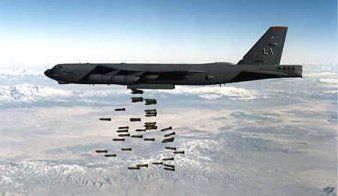Cultural Training - I

Monday November 5, 2001
- TITLE: " Cultural Training - I " This is the first in what will no doubt prove to be an extremely boring series of discussions. Not really. This is already about 110% of everything I know about Islam.
- "... EDS ..."
 Electronic Data Systems is one of the major information technology corporations on the planet. They were kind enough to give me a chance to try out some theories on delivering technology services in places where the normal infrastructure did not exist. Some of the ideas worked, some didn't. But it was a fascinating experience. Electronic Data Systems is one of the major information technology corporations on the planet. They were kind enough to give me a chance to try out some theories on delivering technology services in places where the normal infrastructure did not exist. Some of the ideas worked, some didn't. But it was a fascinating experience.
Here is a thumbnail from Ken Follett's web page: On Wings of Eagles
This is the real-life story of a Green Beret colonel, who came out of retirement to lead a secret raid, the computer executives, shaped into a crack commando team and the Texas industrialist, who would not abandon two Americans in an Iranian jail. After a hairbreadth escape, there is a desperate race for safety. Today the team is back home living normal lives. But for a while, they lived a legend.
- "... Ramadan ..." Ramadan is the ninth month of the Islamic calendar. Islam (as well as Judaism) use a lunar calendar-that is, each month begins with the sighting of the new moon. Because the lunar calendar is about 11 days shorter than the solar calendar used elsewhere, Islamic (and Jewish) holidays "move" each year. This year Ramadan begins on November 17; in 2002 it will begin on November 6.
Christianity uses a moon sighting to establish the date of Easter, thus, from the chariot.net.au website:
Easter Sunday is the Sunday following the Paschal Full Moon (PFM) date for the year. In June 325 A.D. astronomers approximated astronomical full moon dates for the Christian church, calling them Ecclesiastical Full Moon (EFM) dates. From 326 A.D. the PFM date has always been the EFM date after March 20 (which was the equinox date in 325 A.D.).
And this from the Encyclopaedia Britannica: "Western Christians celebrate Easter on the first Sunday after the full moon (the paschal moon)
that occurs upon or next after the vernal equinox (taken as March 21). If the paschal moon, which is calculated from a
system of golden numbers and epacts and does not necessarily coincide with the astronomical full moon, occurs on a
Sunday, Easter day is the succeeding Sunday. Easter, therefore, can fall between March 22 and April 25.
In the Eastern Orthodox church, however, a slightly different calculation is followed, with the result that the
Orthodox Easter, although sometimes coinciding with that of the West, can fall one, four, or five weeks later."

WWII Poster
- Mullings' Catchy Caption of the Day:

Here's the effect of a B-52: It makes the enemy want to quit.
(AP Photo/U.S. Department of Defense)
____________________________________________________________________________________
Home | Current Issue | Past Issues | Email Rich | Rich Who?
Copyright ©2001 Richard A. Galen | Site design by Campaign Solutions.
|




 Electronic Data Systems is one of the major information technology corporations on the planet. They were kind enough to give me a chance to try out some theories on delivering technology services in places where the normal infrastructure did not exist. Some of the ideas worked, some didn't. But it was a fascinating experience.
Electronic Data Systems is one of the major information technology corporations on the planet. They were kind enough to give me a chance to try out some theories on delivering technology services in places where the normal infrastructure did not exist. Some of the ideas worked, some didn't. But it was a fascinating experience.

